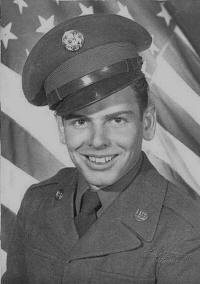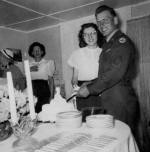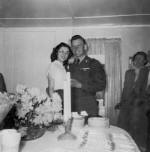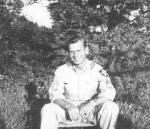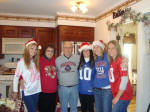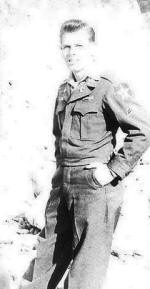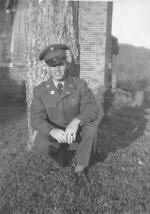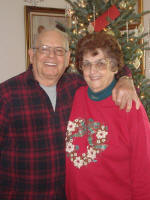|
We need your help to keep the KWE online. This website
runs on outdated technology. We need to migrate this website to a modern
platform, which also will be easier to navigate and maintain. If you value this resource and want to honor our veterans by keeping their stories online
in the future, please donate now.
For more information, click here.
|
|||||||||||||||
 |
|||||||||||||||
| Back to "Memoirs" Index page | |||||||||||||||
Charles Lewis EmersonSidney, New York - "Most of the war I want to forget anyway. I finally made it back home and I know a lot of guys didn’t. I want people to remember those men." - Charles Emerson |
|||||||||||||||
Memoir Contents:Pre-MilitaryMy name is Charles Lewis Emerson of Sidney, New York. I was born June 21, 1932 in the town of Butternuts, New York, a son of Maynard Emerson and Edna Strong Emerson. My father served in the Marine Corps during World War II. After the war he drove a truck for Franks Express, a trucking freight firm, gave boat tours on Cooperstown Lake, and drove a truck for the Otsego Highway Department. My father also worked as a foreman when building the JJ Newbury Department Store in Cooperstown and when building new houses just outside of Cooperstown on Otsego Lake. Mother worked in dry cleaning and was a nurse's aide at Bassett Hospital in Cooperstown until retiring. I spent my childhood in Morris and Cooperstown, New York. I was the oldest of six children. My siblings were brothers Richard and Kenneth, and sisters Carol, Donna and Shirley. I was a year older than my next youngest sibling. We grew up in the Great Depression and my parents struggled to put food on the table. During those years my mother stayed home to take care of us. I attended grade school at Morris Central and high school at Cooperstown Central, but I did not graduate from high school. I quit school to work on the farm. I did not participate in any clubs or extra curricular activities other than football (I was a running back), although I played a little baseball. Cooperstown is the home of the Baseball Hall of Fame. When in 8th grade, our teacher picked three of us boys and told us to get on our bikes and go down to the Baseball Hall of Fame. I did not have a bike so I rode on the crossbar of another boy's bike. We did not know what to expect when we got there. To our surprise, they were filming the Babe Ruth story. They had big cameras on wheels and they wanted all three of us to walk into the Hall of Fame and look into the showcase of Babe Ruth's. One other student and I were too short. That was the end of my movie career. I can't remember the names of the other students. I worked on a farm before and after school. I hired out to the farmer feeding his livestock and milking his cows. I don't remember how much pay I got. I recall that he gave me milk to take home. Don't ask me how much as I don't remember. I worked on a farm in Piers Town just outside of Cooperstown about five miles. That is where we lived at that time of growing up. I later moved to Fly Creek, which was five or six miles from Cooperstown. This is where I lived until I went to work on my grandfather's farm and later enlisted in the Army. I was too young to be in World War II, but I collected scrap metal for the war effort. Joining UpThere was no war or anything going in 1949, but I joined because I wanted to. None of my friends joined the Army at the same time I did. I was working on my grandfather's farm doing typical farm work at the time. I drove myself to the recruiting office in Oneonta, New York and joined the U.S. Army on September 1, 1949. Since I was only 17 years old and underage at the time, I asked my mother to sign for me and she did. My father's advice to me was, "Do as you are told and keep your nose clean." I took a Greyhound bus trip (maybe five hours) to Ft. Dix, New Jersey, where I took basic training. I had never been away from home before. Ft. Dix was a normal basic training camp that was on large and flat land. It was located just outside Newark, New Jersey, and there were flies and mosquitoes there. Our living quarters were two-story wooden barracks that were open quarters (no walls between the bunks). I was on the first floor on the same floor where our instructor's quarters were by the front door. His quarters were boxed off. The bathrooms were on this same floor. On the first day I got a haircut, uniform and boots. I asked for a trim but got a buzz cut--not funny. We were issued boxer shorts, tee shirt, fatigue shirt and pants, socks and boots. The clothes and boots all fit and they were comfortable. We were told to put our civilian clothes with our military issue in a small closet that was between our bunks. When basic was over and we went home on leave, we took our civilian clothes home. There were 20-25 recruits in our platoon and we all lived in the same barracks. We were allowed to go to the PX so I bought writing paper and envelopes. I don't remember what I wrote home about. We were allowed to receive mail, but if I remember correctly, we could not get packages in basic. We were fed well. They gave us milk, juice and coffee, eggs, vegetables and bread. We were also fed bacon, chicken, hamburger and fish, but there was no comparison with my mother's cooking. When we went to chow we could talk leisurely. I had one day of KP while I was in basic training. My job that day was to serve food and wash dishes. I do not remember any recreational facilities. I guess I was too busy with basic training. I was friendly with everyone, but I was too busy training to be a good buddy with anyone. After basic we went our separate ways. Church was offered but most trainees did not take advantage of this and attend. There was not really any fun while in basic, but I was never sorry I had joined. For me, the hardest thing about basic was getting used to the routine, but I did what I was told. We were in peacetime when I was in basic training but I took my training seriously because I knew that my life and that of others depended on it. Basic training was six to eight weeks. Our days were regimented. In the morning our instructors blew a whistle to get us up. We made our beds, showered, had breakfast, exercised, and did normal basic training. We learned how to defend ourselves and how to clean and take our rifles apart and put them back together again. The rifle range was not too far from the barracks. There, we had to learn how to shoot our rifles sitting, standing, laying down and then we had to shoot to qualify. I qualified as a marksman. I already knew how to shoot a rifle before going into basic training because I had shot woodchucks on my grandfather's farm. My father and Grandfather Bill Emerson had taught me how to shoot, but I picked most of it up on my own. I don't think the rifle range instructor was our regular instructor, but I don't remember his name. We also had training in gas masks. We had to put the mask on and make sure it was tight and that we could breathe, then we had to go into a gas-filled room for a short time, maybe three or four minutes. I don't know what kind of gas it was. We had to know how to swim but I already knew how because I used to swim in a creek back home. Our instructor was laid back, but if anyone did not do as he was instructed, the instructor would get in their face. For the most part he was our only instructor. If he had any help, I do not know his name. I was never disciplined for not doing something the right way but others who did not obey orders were. They had to dig a ditch and fill it back up. If there was fighting with others in the platoon, the individual who did it had to mop floors and dig a ditch. There were black recruits, but I did not notice any prejudice toward them. After basic was over there was a parade. I left basic feeling that I was somewhat prepared for combat. I know that I was physically better. I had been in shape when I played football, but in basic training I had to do more physical exercises like push-ups, running, rope climbing, and going on ten and twenty-mile walks, etc. When basic was over, I went home for one week leave, wearing my uniform some of the time while I was there. Nobody commented on the fact that I was now in the Army. After my leave I went to Ft. Lewis, Washington, by bus and then train. Nothing eventful happened on the trip. In advanced training I learned the work of combat engineers--how to lay mine fields, search for mines, different types of mines, mapping mine fields, and bridge construction. The job of a combat engineer was to lay mines and to search for mines ahead of tanks and other heavy equipment, as well as to build bridges where they were needed. We were also used as infantry many times on the line and went on patrols to search, make contact, and estimate how many enemy we might be facing or be attacked by. AP mines were laid in an area that could not be defended by soldiers. These mine fields had to be mapped because we sometimes had to go back and disarm them. The same applied for land mines. I asked for this kind of work. I learned about anti-personnel mines and booby traps--mines that wounded and killed the enemy, and land mines that were used to blow up tanks, trucks, and anything that is heavy. We trained with both live and dummy mines, sometimes in the classroom and sometimes in the field one to five miles from the classroom. As for bridge construction, we built both pontoon and bailey bridges, bailey bridges being the solid bridge. The pontoons were mainly used to cross rivers. Wood for the solid bridges was mainly pre-cut to save time, although in rare cases we might have to cut them ourselves. On some weekends while I was in advanced training, we were allowed to go into town if we wanted. Olympia and Tacoma, Washington were the closest towns to the base. As a rule we could stay the weekend if we chose to and had enough money. Don't ask me how much money I got because I don't remember. We drank a few beers, sometimes saw a movie, and took in the sights. Trip to KoreaWar broke out in Korea in June of 1950. I knew nothing about Korea at that time. In July 1950 we were notified that we were going to be shipped out to Korea. I did not have a chance for a leave to go home before we got orders to pack our gear--clothing, rifle, helmet, etc., and leave for Korea on July 29, 1950 with men and equipment on the troop ship SS Rutger. I had no idea what war would be like since I had never been in combat before. I had no idea what to expect or how long it would last. I was young and I didn't really want to go to war. My parents were worried and concerned. We left for Korea via the ship from Seattle, Washington. As we all got aboard the Rutger, we had to wait for the company commander. I won’t forget that. He and his wife drove up to the dock in a big ole black Cadillac and then he departed the car, kissed his wife goodbye, and started walking up the gang plank. I remember him turning around and waving goodbye to her. I thought then, “Man, he’s kind of old for this kind of thing.” I never got seasick on the ship (I guess I was lucky as others were), but some got very seasick. We ran into a typhoon just before reaching Pusan. It was scary! We ate our meals in the ship's galley, where we stood at tables to eat our food. In rough weather, the food trays slid off the tables. I remember It took several days to get there, so we played cards and had fire drills on the journey. I don't remember any movies. We had to keep our area clean and keep our guns clean. We also had target practice. The only ones I knew on the ship were the ones who were in training at Ft. Lewis. We had no stop along the way. The ship made a straight shot to Korea. We got there in middle or late August, somewhere around in there. I don’t remember the time. Pusan PerimeterAfter departing the ship, we set up a perimeter around Pusan along with other parts of the Division. Later on we started to go after the enemy by doing short jabs in their line and taking the heat from it. In the first real firefight we got in to, we lost our company commander and a couple of other officers. This was mainly due to the fact that they wore a red scarf on their neck. The battalion flag was a red scarf flag that featured an engineer's insignia on it. We used it in our parades back in Washington. The red scarf that the officers wore signified the colors of our battalion. I was a Sergeant First class in the 2nd Engineer Combat Battalion, 2nd Infantry Division for the United States Army. We eventually fought our way to the Naktong River. There we started to build a pontoon bridge across the river, but we came under heavy fire and started diving under trucks and everything else. We finally called in air support and they kind of quieted things down. After awhile, we finally got the bridge built. I remember seeing a lot of dead North Koreans floating down the river and there was a dead Korean nurse on the beach. We started moving our way up north as far as we could go that day, then we set up a perimeter there. The next day we formed a patrol. There was a squad of us. It consisted of a lieutenant and a sergeant, and I got chosen to put a radio on my back and go with them. The radio was what they called a 300. There was a little bit more to it than that, but I don’t remember what it was. We set out on the patrol, and our mission was to contact the enemy and estimate how many there were and report back to headquarters. We made our way up through the rice paddies and the burns. "Burns" were mounds of grass knolls between the paddies. I remember as we were going up through there, there was like a dike between one of them that had a tunnel from one paddy to the other. We hollered in there that if there were any GI’s in there they should come on out because we were going to throw some grenades in and blow up anything that was in there. Nobody came out. We went a few hundred yards up the burn and there was a dead GI laying half in the water and half out. We dragged him up on the bank, and made note of his dog tags and what was on them. We then proceeded up to make contact. As we went up through there we made some contact and the next thing we knew we were right in the cross-fire. I remember calling the artillery forward observer and telling him, "There’s three little hills out in front of us and that’s where we seem to be getting the fire from." I asked the FO to have the artillery throw in a couple of rounds and then we would go from there. He knew where we were, but didn’t know how far up that hill. I said, “It’s about halfway up.” He let one round go. I told him that it landed at the bottom and that it had to go up quite a bit further. He got back with me and said he just couldn’t call in any more rounds because he couldn’t see because of the fog. By then things were getting pretty hot and heavy so we decided to move back. In the process, five out of the eight of us were wounded. The date was September 9, 1950. I remember hearing the bullets zipping between my legs. The guy next to me, "Sarge", caught one in the foot and I caught one in the wrist. I grabbed onto him and another guy grabbed him on the other side and we got back far enough so we were out of range. I called back in to get some medics up there and jeeps to get the wounded out of there. Some were hit pretty badly, so they did. As we were getting the wounded ready, a GI yelled for us to not shoot him. He said he had been in the rice paddy for several days and did not dare to move for fear of getting shot. Apparently there had been other American patrols or units in the same area. We finally got the wounded out, and we all ended up on a train heading back to the field hospital. I’ll never forget that train ride. The train windows were open when we went through a mountain. I’m telling you, the smoke and stuff came in that train and about choked us to death. Back at the field hospital, they dressed my wound and made sure the bleeding and everything had stopped. The next thing I knew, I was back on that train heading to the front again. When we got back up there, we had a few more firefights. The next thing I knew, I had an infection in my wrist, so back to the field hospital I went. I was back there for a few days until they got the infection out and got it sewed up, then back to the front we went again. It was still September. After I went back to the front the second time, an officer approached me and two other solders that were on the patrol to sign a paper that would give the sergeant a Bronze Star for action on the patrol. We signed it, but we could not figure out what action he did that was any different than what we did. I guess if you have stripes or bars, you get first choice at medals. I’m not saying that some don't deserve them--as I am sure they do. But in this case, I don't think the sergeant did. Evacuated with PneumoniaWe just kept fighting our way back up toward the north and I remember we ended up in Seoul, Korea. I don't remember exactly what day it was because after a while, days didn’t mean anything to us. We just "got up and went, got up and went" and kept on trucking. When we arrived in Seoul we saw the Bob Hope Show. He kind of made a remark, “Where's the Marines?” They're supposed to be here before we are.” The Marines were having a little problem in Inchon, I think it was, but they got there. I remember we were sitting on an old roof and it caved in. The next thing I knew, we were sitting in some guy’s so-called living room. After the show we proceeded to move out and do our thing. As we moved toward the North Korean capital, things kind of quieted down for a period of time. Then things started to get heated up and we kept moving north. We finally ended up near the border between North Korea and China. I remember looking out over the big frozen river up there. They said that was the Yalu River and China was on the other side. It wasn't long before China was on this side. We started getting it from everywhere. I remember it was freezing cold. A lot of guys got their fingers and toes froze and it just kept getting worse. Our division, the 2nd Infantry Division, was chosen to hold them back as long as we could until the 8th Army got out of there, so we did. A lot of the units got ran over and ended up behind enemy lines. Everyone was extremely cold. I remember we all ended up at a huge supply depot. There, we split up into two groups. They told us we had to get out of there as soon as possible. It came over the radio that they were going to come in there in the morning bright and early and blow the place up. We had to get out of there. The group I was with was going to take the high ground. I remember I was leaning up against a tree and the next thing I knew somebody was booting me in the butt. I guessed I must have passed out on the ground or something. He said, "We have to go and we have to be quiet." Away we went. As we were walking, we walked around an enemy camp. They were sitting down there by a nice hot fire eating their garlic and whatever else. We could smell that garlic most all the time around those people. I don’t know how many days we were behind enemy lines. I remember one instance when one of the Marine Corps airplanes came flying by. He spotted us on the mountain and he flipped his wings and kept going. We had a piece of orange plastic that we used to lay out in front of us so that when we had strafing missions they could strafe ahead of it and not behind it. That’s where we were. We kept waving it at him so he wouldn’t shoot at us. He flipped by upside down and gave us the thumbs up. He kept going and we were hoping he would because we didn’t want to draw attention to us. I don’t know how many days we kept walking. I got weaker and weaker and so were a lot of the other guys. We hadn't had anything to eat and not much rest. I remember we finally kept walking down this mountain until we got to an old road. I had a bandoleer of ammunition on my shoulder, and I tell you, that thing felt like it weighed three tons. I couldn't believe it. I hollered to the guy behind me and said I was taking it off and dropping it on the road and to pass the word back. I said, "If somebody has strength enough to pick it up, pick it up." We finally made contact with a unit that I believe was a 1st Cavalry unit. They gave us a little chow and sent us back. At the field hospital (there were female nurses there), I found out I had a real bad case of pneumonia. The next thing I knew I was on an airplane headed to a hospital in Japan. I remember the plane was a big old thing. We went to an island and got off the plane. We got on another small plane heading for Tokyo, Japan. The plane skimmed right across the water. I finally asked somebody how come we were so low to the water. We could almost reach out and touch the waves. They said, “Well, the MiGs are still around. We didn’t want to get up too high.” In the hospital in Japan, they gave me a hospital gown and told me to go down and clean up. When I looked in the mirror I didn’t even recognize myself. I had a beard. I never had a beard like that before. In Korea it was so cold that when we breathed out, the mist from our mouth froze our beard so we could hardly talk I remember laying in the hospital bed. There was a whole ward of us in there and every morning a nurse came in. She would say, “Bottoms up" and we bared our buns and "ping-ping-ping-ping", down the line she went, giving everyone a penicillin shot. That seemed to be the thing back then. After a few days I got out of the hospital. It was around Christmas time, I think. They had a little Christmas tree there. It didn’t mean too much to me then. I had a short R&R when I got out of the hospital. It was for a week and I spent it in a little mountain resort. I spent most of my time walking trying to get back in shape. R&R was good in that I had a warm place to sleep and good meals, but I always had going back to the front on my mind. The next thing I knew I was on a plane back to Korea and I was sent back up to the front again. On the way, I remember meeting and talking to a new replacement--a scared young 2nd Lieutenant who wanted to know how to treat his men in combat. I told him, "Treat your men as your buddies and be up front with them. Don't ask your men to do anything that you would not do." Return to BattleBy then, the 2nd Division had recuperated their losses after the beating it took from the holding action for the 8th Army. Back to the line we went. I remember I was on this hill and we thought we had it secured for the night. Two guys were supposed to be our point men. I was on the field phone. If they heard anything, they were supposed to let me know and I was to call Headquarters and tell them we are going to be attacked. Well, I did not hear anything from those guys and the next thing I knew all I heard was a Chinese talking. I got on the field phone trying to get somebody to answer, but nobody would. The Chinese got closer. I had to get to the .30 caliber machine gun. He flushed me out of there like I was a rabbit and I ran like one, too. I zigzagged and I heard the burp gun shooting. I yelled at the guy on the .30 to shoot that SOB, the gun went bang, and that was it. I remember that it was so cold. By then all hell broke loose and we were getting pushed back off the hill. I remember going over a steep bank and the next thing I remember was a .50 caliber barrel flew over my head. We were always instructed, "If you could not take it with you, make it unusable." We made it to the road where we reassembled. The guy on the .30 came over to me and said he could not shoot because I was between him and the guy shooting the burp gun who was cutting the brush right at my heels. We later retook the hill. We lost a few men. Some said they played dead and the Chinese walked right over them. Many MemoriesAnother time we were out on patrol. We went quite a ways, came back, and dug in on two different hills. The road ran between them and we had a .50 set up close to the road. He heard footsteps coming down the road that sounded "different". The guy on the .50 challenged them and all hell broke out. Men got hit and there was hollering and some screaming. The men on the other hill were all killed except one man. He said he laid in a ditch. Tanks were called up and by daybreak it was all over. I remember another time the whole division got pulled off the line for a well-deserved break. We were given beer and whiskey rations. The NCO'S and officers got whiskey. We got a big tent with straw, a sleeping bag, and a pot belly stove. The officers got a building to sleep in. It was near an ammunition dump. During the night we heard a loud explosion. We ran outside and it was like the Fourth of July. We ran for a small bank, laid against it, and prayed none of it would come our way. We heard later that the officers got pretty drunk and some officers got relieved of duty. They must have had a real headache. Another time I ran into one of my buddies. He was on leave when we got called up to go to Korea. We shipped out of Washington before he could get back, so when he did get back they put him in the 38th Infantry Regiment which we were attached to. I was going up a steep mountain that we had to use ropes to get up and down, and he was coming down as I was going up. We were quite surprised to see each other. We had a few words, wished each other good luck, and went on our way. We had a little problem with the English. They always had to have their tea at a certain time of day. They started a fire to heat their water and when the smoke cleared the top of the mountain, here came the mortars. Those Chinese were pretty good with those mortars. I remember the Company Commander went down there and chewed them a new butt. He told them, “Hey, you make tea in cold water because we aren’t going to have any more of this.” It never did happen again after that. I remember on another occasion we were ahead of a tank doing mines. The gooks were pretty good at laying mines. Their mines were very hard to detect because they only used metal detonators. They put them on the first mine, which was deepest in the ground, and piled three or four wooden mines on top. Our mine detectors didn’t go deep enough to detect them, so we had to probe for them. The tank commander couldn't wait and told us to get the hell out of the way. We told him we were just doing our job. but we weren’t going argue with him. He went about seventy-five yards and "BOOM"--he hit a mine and it rolled the tank on its side. I don't know how many got hurt, but we had to call for a piece of heavy equipment to remove the tank and then we proceeded doing our thing. The next tank wasn't in such a hurry. He stayed behind and we got the road cleared. Before that, we were filling a large crater the Chinese had blown in the road. It was dug into the side of a cliff. It went all the way down to the river, so we had to sandbag it up and fill it with rocks and anything else we could find. We were pretty near the top and one of trucks was backing up with a load of rocks getting ready to dump when it hit a mine. I remember hugging the cliff, because it blew the duals right off the truck. I was back against the cliff looking up to see where the duals were going to come down so I could get out of the way when it came right down in the hole. There was just a big cloud of dust where the truck was--what was left of it. Next I saw two guys running out of the dust, heading right down the road just as fast as they could go. It happened to be the driver and the co-driver. It was kind of funny afterwards. We had to push the truck off the road. Down into the river it went. I think any war is serious and we were very serious about what we were up against. I don't recall many lighter moments when I was in Korea, but the incident above and another one come to mind. The other was when we got pulled back in reserve. We got our rations (beer, whiskey, cigarettes) and the officers tipped over a stove and set an ammo dump on fire. We were on a mountain dug-in for the night when toward morning all hell broke out. The Chinese were coming by the hundreds. Some GIs caught in their foxholes were bayoneted or shot. We fought until daybreak. I0 helped load the wounded onto stretchers. It was hard when we had to pick them up and load them into the ambulance at dark. Some of them were hurt so bad they hollered in pain. The only light was a dome light inside the ambulance and we had to be very careful when entering it because of all the blood on the floor. By daybreak all the wounded were taken care of and we moved back to regroup. Some tried to get on the tank side facing the mountain when rifle fire binged off the tank. Most of us stayed on the opposite side of the tank until we were out of range. As we were walking down the road, I think there was a one-star General in a jeep. He stopped by me and said, “Son, are you alright?" I said, “Yes, Sir. Why do you ask?” He said, “You’re all covered with blood.” I said, “I was helping loading wounded into ambulances.” I remember we took quite a while getting back far enough to regroup. We stopped by a river and I took my clothes off and washed them in the river. I don’t remember the name of the river. Another time we were setting up a road block because the ROK had been run over by the Chinese. They had abandoned all their weapons, leaving our left flank open. We had a quad fifty on a half-track and all these Koreans--hundreds of them, just kept coming. The higher-ups would not let us stop them. We knew they were enemies dressed as refugees but we were ordered to let them go. Everyday LifeKeeping clean in Korea was hard to do, especially in the winter months. It might be a month or more before we could shave or get our clothes washed. In the summer months we sometimes got a Korean to wash our clothes if we were near a river. This was the only contact I had with the natives. They lived a poor life at that time period. They lived in mud and stone huts with thatched roofs. The children helped in the rice paddies or played in the dirt streets. The food I missed from the States was my mother's cooking--it was the best (the apple pie, yum!). Food on the front lines was once every other day if we were lucky, depending on the fire fights we were involved in, and it was the usual army rations we had on us at that time. When in reserve, we got a warm meal. I personally did not eat the native food as I did not care for garlic and rice. I don't think any of the other men did either. The best thing I had to eat in Korea was Thanksgiving dinner. We were lucky to have a short lull in battle and the kitchen brought a warm turkey dinner to us. That Thanksgiving was the only holiday I spent in Korea. Christmas was spent in Japan in the hospital. I had just turned 18 years old prior to shipping out in late July from Seattle, Washington. The following June on my 19th birthday it was just another day. We were probably in a fire fight of some kind. That was usually the norm. The only USO show that I saw was the Bob Hope Show in Seoul as we were pushing north. He put on a good show for us and then later that day we pushed north. I did not have any contact with the Red Cross or Salvation Army while in Korea. I never was a gambler or a drinker, although I did take up smoking after joining the Army. I was a very light smoker. The only time we got to do any of this was when we got pulled off the front line for rest. I did not smoke or gamble prior to Korea, although I had a beer once in a while. What leisure time I had was spent trying to get some rest. We got mail maybe once a month, depending on what the conditions were. My mail was from my parents. I never asked for anything and I did not get packages. I had no relative that served in the Korean War, although I had a younger brother who served in the Army in Germany during that time period. I never met anyone I knew from the States when I was in Korea. I also did not have any close buddies while I was in Korea, as we weren't together very long at Ft. Lewis, Washington before shipping out. I did not get to know any of the guys long at all as they were getting killed or wounded. Since we were always on the move, I did not spend any time in a bunker either. We usually did not have time to dig foxholes or build bunkers. Going HomeI was told early one morning to get my gear together (which was not much--rifle, grenades, ammo) because a jeep would pick me up shortly and it was my time to go home. That morning our unit was getting ready to move out in support of our infantry buddies to take a hill. When I left my unit I was the happiest guy in the world, but I felt bad for the guys that had to stay in that hellhole. When I got back to the rear I turned in my gear and picked up my orders. I don't remember the exact day, but I left Korea in late July 1951 with the rank of Specialist First Class (Sfc). I left on the ship the USNS General John Pope with 4,290 Korean War vets coming home. None of them were from my unit. The mood on the ship was one of great relief from the war. My mood was also relief from the war, and prayer for those who had to stay and continue the war. Duties on the ship for me were to keep my area clean. We had good weather coming home, but there was still some seasickness. It took about 20-plus days to get back to the States. I don't remember the exact number of days. The men mainly played cards and shot craps (dice). There was a lot of gambling going on. Going under the Golden Gate Bridge and seeing the hills in the background was a sight to behold. It was great getting back to the USA. We disembarked from the ship at the San Francisco port of embarkation. There was no one at the port other than military with the exception of newspaper hackers selling two-day old papers with the cover paper a picture of the ship and the list of all the men returning from Korea. It just goes to show you the kind of people that are out there. If I remember correctly, we were put on smaller boats and taken up a small waterway to a base for processing. I don't remember what the base was called, but I remember that the first thing I did when I got off the ship was thank God that I was back on American soil. After being processed, I got my plane ticket home. I had a day lay-over, so a couple of soldiers and I did a little sightseeing before leaving San Francisco. The flight home was a little scary due to bad weather. We had to land somewhere in the Midwest and the water as up to the runway. We stayed overnight and left the next morning. It was very foggy in Chicago. We couldn't see the runway until we got below the high rise buildings. I finally left Chicago and made it to Albany, New York, where my parents picked me up. Post-KoreaI was an employee at Bendix (Amphenol), an aerospace company in Sidney, for 30 years, primarily in the molding department. After working for years in the factory, I needed a high school diploma or GED. I went nights to school until I got it. I was in my late forties at the time. My family was very proud of me. I was asked to become a Method's Engineer, which I accepted until I retired. I was later called back to help out on certain projects. This lasted for four (4) years. I continue to live in Sidney, with my wife, Evelyn. Together we have four children – Bob Emerson, Debbie Tranvaag, Joanie LaRose-Thomas, and Sheri Kinsella. We also have 10 grandchildren and 10 great grandchildren. Looking BackIn sharing my memories of Korea, I know I missed a lot. It was a long time ago. My strongest memories of Korea are of arriving in Pusan, seeing the scared look on the faces of the people, and the smell. Most of the war I want to forget anyway. I finally made it back home and I know a lot of guys didn’t. I want people to remember those men. I did not see any racial prejudice in our unit while I was in Korea. We all stood shoulder to shoulder during that war. I saw and heard soldiers cry from their severe wounds. It was not pleasant. I was under the impression that we were in Korea to stop communism from taking over the south. At the early stages of the war it seemed that the South Koreans weren't interested in fighting for their country when we were in the Pusan Perimeter. We had South Koreans in foxholes with us at night. They would leave and never come back. Our unit got a few citations. I was awarded the Korean Service Medal with six bronze service stars, a Republic of Korea (ROK) Presidential Unit Citation, and United Nations Service Medal. I also received the Purple Heart because of the wound I suffered on September 9, 1950. I got the Republic of Korea War Service Medal that commemorates the 50th anniversary of the outbreak of the Korean War. This medal was given as a thank you from the President of the Republic of Korea, Kim Dae-jung, to those veterans who served within the inclusive period of June 25, 1950 to July 27, 1953. The service must have been performed while on permanent assignment in Korea. I perceive a "war hero" as a person or persons who put their life on the line to save others. I did serve with such a person, but I don't remember his name. He was manning a .50 caliber machine gun which was guarding a road between two hills at night. The gunner heard footsteps different than GI's, so he challenged them. It turned out to be the enemy and all hell broke loose. His action, I am sure, saved many lives. The time that I felt I was in the most personal danger was when the Chinese entered the war. It was bitterly cold and we were greatly outnumbered. It was fight and hold as long as we could, then retreat and do it over again. When the Chinese entered the war was the only time I was discouraged. We were so out-numbered. The hardest thing about being in Korea was not being able to see my parents and friends. Note from Daughter Sheri Kinsella
|
|||||||||||||||
Photo Gallery(Click a picture for a larger view) |
|||||||||||||||
|
|||||||||||||||
 |
|||||||||||||||


